The Hashimoto's Thyroiditis Therapeutics Market is estimated to be valued at USD 8.8 billion in 2025 and is projected to reach USD 15.4 billion by 2035, registering a compound annual growth rate (CAGR) of 5.8% over the forecast period.
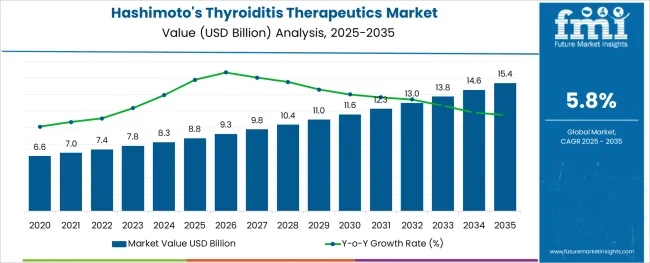
The Hashimoto's Thyroiditis therapeutics market is expanding steadily, driven by growing awareness of thyroid disorders and improved diagnostic capabilities. Increasing prevalence of autoimmune thyroid diseases has necessitated effective treatment options, supporting market growth. Therapeutic advancements have focused on improving patient compliance and treatment efficacy, especially with synthetic thyroid formulations that mimic natural hormone activity.
Rising healthcare access and evolving treatment protocols have encouraged earlier intervention and sustained management of the disease. The growing elderly population and increasing health screenings have also contributed to higher diagnosis rates.
Future growth is expected to be supported by innovations in drug delivery systems and personalized therapy approaches. Segmental momentum is expected to be led by Oral Powders in dosage form, Intravenous routes of administration, Synthetic Thyroid as the dominant product type, and Drug Stores as the primary distribution channel.
The market is segmented by Dosage Form, Route Of Administration, Product Type, and Distribution Channel and region. By Dosage Form, the market is divided into Oral Powders, Capsule, Intravenous Injection, Oral Solution, and Tablet. In terms of Route Of Administration, the market is classified into Intravenous and Oral.
Based on Product Type, the market is segmented into Synthetic Thyroid and Desiccated Animal Thyroid. By Distribution Channel, the market is divided into Drug Stores, Hospital Pharmacies, Mail Order Pharmacies, and Retail Pharmacies. Regionally, the market is classified into North America, Latin America, Western Europe, Eastern Europe, Balkan & Baltic Countries, Russia & Belarus, Central Asia, East Asia, South Asia & Pacific, and the Middle East & Africa.
The market is segmented by Dosage Form, Route Of Administration, Product Type, and Distribution Channel and region. By Dosage Form, the market is divided into Oral Powders, Capsule, Intravenous Injection, Oral Solution, and Tablet. In terms of Route Of Administration, the market is classified into Intravenous and Oral.
Based on Product Type, the market is segmented into Synthetic Thyroid and Desiccated Animal Thyroid. By Distribution Channel, the market is divided into Drug Stores, Hospital Pharmacies, Mail Order Pharmacies, and Retail Pharmacies. Regionally, the market is classified into North America, Latin America, Western Europe, Eastern Europe, Balkan & Baltic Countries, Russia & Belarus, Central Asia, East Asia, South Asia & Pacific, and the Middle East & Africa.
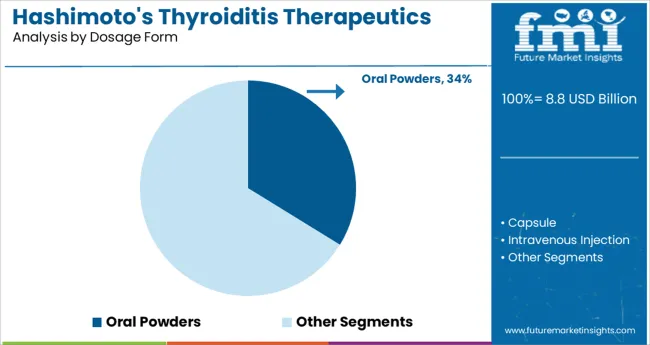
The Oral Powders segment is projected to account for 33.8% of the Hashimoto's Thyroiditis therapeutics market revenue in 2025, maintaining its lead among dosage forms. This segment’s growth has been driven by the convenience and ease of dosing oral powders, which offer flexible administration options for patients.
Oral powders facilitate better absorption and bioavailability, enhancing treatment outcomes. Additionally, patient preference for non-invasive administration methods has further supported the popularity of oral powders.
The segment has benefited from formulation improvements that enhance stability and shelf life. Given the chronic nature of Hashimoto’s Thyroiditis, oral powders provide a practical and patient-friendly option that supports adherence over long-term treatment periods.
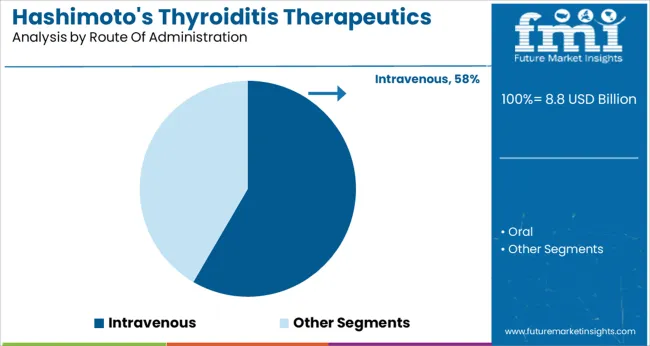
The Intravenous segment is expected to contribute 58.4% of the market revenue in 2025, dominating the route of administration category. Intravenous delivery allows for rapid and controlled hormone administration, which is critical during acute management or in hospital settings.
This route is preferred when precise dosing and immediate bioavailability are necessary, especially in severe hypothyroid states or when oral administration is contraindicated. Medical facilities and specialists have increased utilization of intravenous therapy due to its efficacy in stabilizing patients quickly.
The ability to closely monitor patient response and adjust doses promptly has driven the adoption of this administration method in clinical practice.
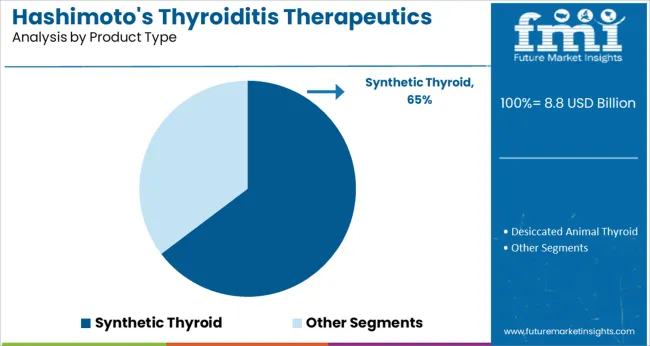
The Synthetic Thyroid segment is projected to hold 64.7% of the Hashimoto's Thyroiditis therapeutics market revenue in 2025, positioning it as the leading product type. This dominance is attributed to the widespread use of synthetic thyroid hormones as the standard treatment for hypothyroidism caused by autoimmune thyroiditis.
Synthetic thyroid products effectively replace deficient hormones and restore normal metabolic functions. Their consistent potency, availability, and cost-effectiveness have made them preferred over natural extracts.
Continuous clinical validation and physician familiarity with synthetic options have reinforced their dominance in therapy regimens. The segment’s growth is also supported by advancements in formulation technology improving patient tolerance and minimizing side effects.
The lack of iodine in the body is expected to lead to the rising prevalence of Hashimoto’s thyroiditis in the near future. As per the World Health Organization (WHO), more than 1.9 billion people have inadequate iodine nutrition across the globe. Out of these, nearly 285 million are school-aged children. These numbers are likely to surge in the forthcoming years, thereby bolstering the sales of Hashimoto's thyroiditis therapeutics.
The ongoing development of numerous effective combination drug therapies for the treatment of thyroid gland disorder is anticipated to fuel the market. In addition to this, the presence of a large undiagnosed patient pool owing to the asymptomatic nature of their thyroid disorders is set to create new growth opportunities for key players.
The high entry barrier is expected to hamper the Hashimoto's thyroiditis therapeutics market growth in the upcoming years. The presence of multiple established companies, stringent compliance requirements, and strict norms for product commercialization are anticipated to make it difficult for small-scale firms to launch cutting-edge products.
The drugs that are required for the treatment of Hashimoto's thyroiditis are carefully manufactured with the help of novel techniques. These techniques are either trade secrets or patented by leading companies. This can create major challenges for new players as they are incapable of achieving such perfection during the manufacturing of drugs.
The inability of start-up companies to maintain long-term relationships with physicians and the marketing teams of renowned vendors is another factor that may obstruct the growth.
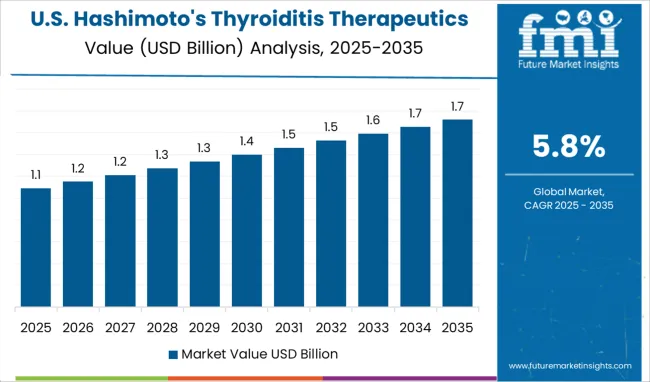
North America is likely to remain at the forefront by generating the largest Hashimoto’s thyroiditis therapeutics market share in the assessment period. The rising cases of thyroid disorders in the U.S. and Canada is a significant factor that is projected to augur well for the market.
According to the American Thyroid Association, approximately 20 million Americans suffer from some form of thyroid disease and more than 12% of the U.S. population will develop a thyroid disorder in their lifetime. This trend is set to continue throughout the forecast period, thereby pushing the North America market.
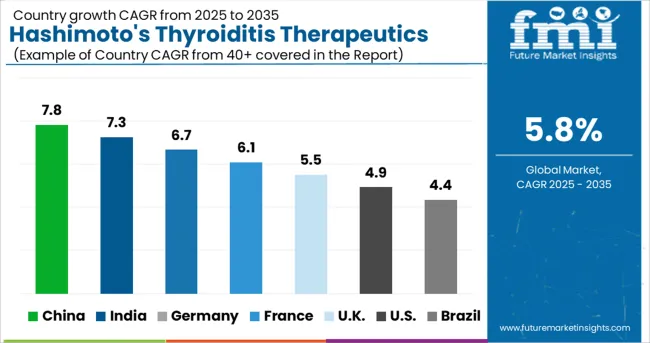
The presence of numerous established players and the high healthcare expenditure in the U.K. are set to spur the Europe Hashimoto’s thyroiditis therapeutics market size in the evaluation period. Many non-governmental and governmental organizations in this country are expected to launch new campaigns that would help people in better understanding the preliminary symptoms of complex thyroid disorders.
The rising exposure to harmful radiation is another vital factor that is anticipated to accelerate the market. The increasing prevalence of hyperthyroidism across Europe owing to the surging smoking habit among people is also expected to bode well for the market.
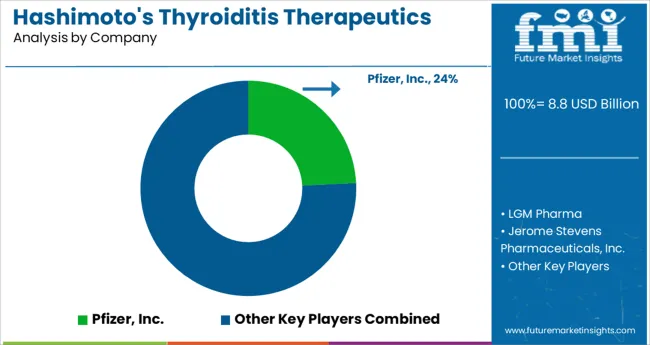
Some of the leading companies present in the global Hashimoto’s thyroiditis therapeutics market are Pfizer, Inc., LGM Pharma, Jerome Stevens Pharmaceuticals, Inc., Merck KGaA, Shenzhen Zhonglian Pharmaceutical, Taj Group, Berlin-Chemie, Sandoz, Sichuan Hairong Pharmaceutical, and Manus Aktteva among others.
Majority of the leading players are deploying numerous strategies, such as collaboration and acquisition to remain at the forefront in the market. Some of the other companies are investing huge sums in research and development activities to introduce innovative therapeutics and gain fast track approval from government bodies. Meanwhile, a few others are focusing on expanding their manufacturing facilities to meet the high demand for novel healthcare products worldwide.
| Report Attribute | Details |
|---|---|
| Growth Rate | CAGR of 5.8% from 2025 to 2035 |
| Base Year for Estimation | 2024 |
| Historical Data | 2020 to 2024 |
| Forecast Period | 2025 to 2035 |
| Quantitative Units | Revenue in billion, Volume in Kilotons and CAGR from 2025 to 2035 |
| Report Coverage | Revenue Forecast, Volume Forecast, Company Ranking, Competitive Landscape, Growth Factors, Trends and Pricing Analysis |
| Segments Covered | Product Type, Dosage Form, Route of Administration, Distribution Channel, Region
|
| Regions Covered | North America; Latin America; Western Europe; Easter Europe; APEJ; Japan; Middle East & Africa
|
| Key Countries Profiled | USA, Canada, Brazil, Argentina, Germany, UK, France, Spain, Italy, Nordics, BENELUX, Australia & New Zealand, China, India, ASEAN, GCC, South Africa
|
| Key Companies Profiled | Pfizer, Inc.; LGM Pharma; Jerome Stevens Pharmaceuticals, Inc.; Merck KGaA; Shenzhen Zhonglian Pharmaceutical; Taj Group; Berlin-Chemie; Sandoz; Sichuan Hairong Pharmaceutical; Manus Aktteva
|
| Customization | Available Upon Request |
The global hashimoto's thyroiditis therapeutics market is estimated to be valued at USD 8.8 billion in 2025.
It is projected to reach USD 15.4 billion by 2035.
The market is expected to grow at a 5.8% CAGR between 2025 and 2035.
The key product types are oral powders, capsule, intravenous injection, oral solution and tablet.
intravenous segment is expected to dominate with a 58.4% industry share in 2025.






Full Research Suite comprises of:
Market outlook & trends analysis
Interviews & case studies
Strategic recommendations
Vendor profiles & capabilities analysis
5-year forecasts
8 regions and 60+ country-level data splits
Market segment data splits
12 months of continuous data updates
DELIVERED AS:
PDF EXCEL ONLINE
Biotherapeutics Virus Removal Filters Market Trends – Growth & Forecast 2025 to 2035
COPD Therapeutics Market Report – Growth, Demand & Industry Forecast 2023-2033
Digital Therapeutics and Wellness Market Size and Share Forecast Outlook 2025 to 2035
Digital Therapeutics Market Size and Share Forecast Outlook 2025 to 2035
Peptide Therapeutics Market Analysis - Growth & Forecast 2024 to 2034
Advanced Therapeutics Pharmaceutical Outsourcing Market Size and Share Forecast Outlook 2025 to 2035
Glaucoma Therapeutics Market Size and Share Forecast Outlook 2025 to 2035
Leukemia Therapeutics Treatment Market Analysis - Growth & Forecast 2025 to 2035
Microbiome Therapeutics Market Size and Share Forecast Outlook 2025 to 2035
The Canine Flu Therapeutics Market is segmented by product, and end user from 2025 to 2035
Stuttering Therapeutics Market Trends, Analysis & Forecast by Treatment, Type, End-Use and Region through 2035
Pet Cancer Therapeutics Market Insights - Growth & Forecast 2024 to 2034
Candidiasis Therapeutics Market Size and Share Forecast Outlook 2025 to 2035
Lung Cancer Therapeutics Market Analysis – Size, Share, and Forecast Outlook 2025 to 2035
Heart Block Therapeutics Market Size and Share Forecast Outlook 2025 to 2035
Aquaculture Therapeutics Market Size and Share Forecast Outlook 2025 to 2035
Fucosidosis Therapeutics Market - Growth & Innovations 2025 to 2035
Market Leaders & Share in Alzheimer’s Therapeutics
Alzheimer’s Therapeutics Market Analysis by Disease Class into Cholinesterase Inhibitors, NMDA Receptor Antagonists and Combinations Through 2035.
Sarcoidosis Therapeutics Market

Thank you!
You will receive an email from our Business Development Manager. Please be sure to check your SPAM/JUNK folder too.
Chat With
MaRIA